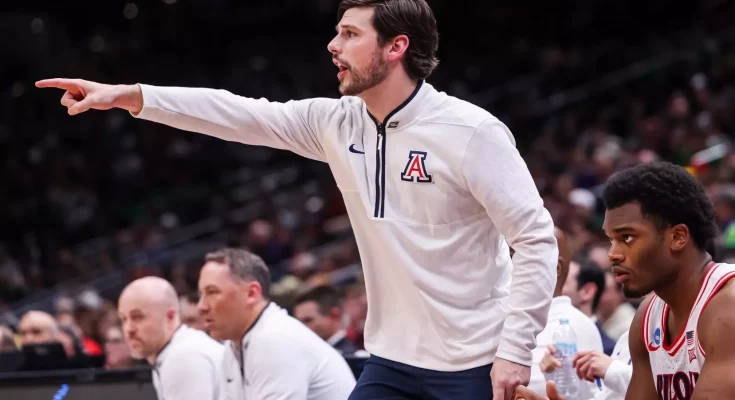Texas Tech men’s basketball is entering a new chapter under head coach Grant McCasland, and the recent announcement of two key additions to his coaching staff signals a strategic effort to reshape the Red Raiders’ identity on and off the court. The hiring of Rem Bakamus as an assistant coach and the addition of Luke Simons in a support role are more than routine staffing updates—they are statements about the future direction of the program, the philosophy McCasland intends to instill, and the type of culture Texas Tech basketball wants to embody as it enters another fiercely competitive Big 12 season. These aren’t just names being plugged into a staff chart. They are carefully selected individuals who bring with them a blend of experience, character, and basketball intelligence tailored to the vision McCasland has been building since arriving in Lubbock.
Rem Bakamus may be relatively young by traditional coaching standards, but he is already well-respected in basketball circles. A former walk-on guard for Gonzaga University, Bakamus spent five years under the tutelage of head coach Mark Few, one of the most consistently successful coaches in college basketball. His time at Gonzaga wasn’t marked by minutes on the floor but by something arguably more important—immersion in a culture of accountability, cohesion, and excellence. Bakamus was widely known as a vocal leader, a cultural tone-setter who helped maintain the intensity and focus of a program that contended for national championships year after year. He understood his role and executed it flawlessly, earning the respect of teammates and coaches alike. His basketball IQ, emotional intelligence, and tireless work ethic became his calling cards, which have now translated into a promising coaching career.
After graduating from Gonzaga, Bakamus moved into the coaching world and eventually found a spot on Scott Drew’s staff at Baylor University, where he served as Director of Player Development. At Baylor, he continued his trajectory in a program that won a national title in 2021 and has sustained its elite status in the ever-rigorous Big 12. Working with Scott Drew—a coach renowned for developing talent, maximizing potential, and fostering a player-first culture—was an invaluable experience. Bakamus was deeply involved in scouting, film analysis, and individual skill development, roles that allowed him to cultivate a deeper understanding of the tactical side of the game and how to translate analytics and film into actionable insights for players. His presence at Baylor provided a behind-the-scenes force that helped athletes elevate their performance while also creating a positive and disciplined environment in the locker room and in practice.
For McCasland, bringing Bakamus into his inner circle is a savvy move. It aligns with the broader movement across college basketball, where programs are increasingly turning to youthful, innovative coaches who can relate to players and understand both the modern game and the human elements behind it. Bakamus doesn’t just know the X’s and O’s—he’s lived the grind of a student-athlete, served within elite programs, and embraced the evolving world of player empowerment, NIL, and the transfer portal. That’s an incredibly valuable package, especially at a place like Texas Tech, where maintaining competitiveness in the Big 12 requires more than talent—it requires the cohesion and culture that coaches like Bakamus help instill from day one.
McCasland’s decision to also bring in Luke Simons is equally strategic. Though Simons won’t have the same high-profile title as Bakamus, his role within the staff could prove just as critical. Simons has built a name for himself as a basketball mind with a knack for analytics, scouting, and behind-the-scenes support that sharpens a team’s overall competitive edge. Coaches and programs across the country are increasingly investing in specialized support roles—whether it be for data analysis, player performance tracking, or opponent scouting. It’s no longer sufficient to just have a solid bench coaching trio. The difference-makers are often the ones in the background, pouring over hours of film, designing practice schedules, or crunching advanced statistics to find trends that can tilt games. Simons, who has worked previously in various collegiate environments, has earned a reputation as someone who understands how to translate abstract basketball data into real competitive advantages.
His skill set complements what McCasland already has in place and suggests that Texas Tech is building a backroom as strong as its frontline. In an era where margins are razor thin and every conference game is a war of attrition, this sort of internal cohesion and operational sophistication becomes critical. Simons will likely play a substantial role in ensuring that Texas Tech players are maximally prepared, not just with scouting reports but with information tailored to their individual strengths, habits, and tendencies. In many ways, the addition of Simons adds a hidden layer of preparation that often goes unspoken but can be the difference in late-game execution or game-to-game consistency.
These hires also reflect McCasland’s own background and values. Before taking the reins at Texas Tech, McCasland built his resume through grit, relentless attention to detail, and an ability to overachieve with less. At North Texas, he took a mid-major program and turned it into a consistent winner, culminating in an NIT Championship and multiple deep postseason runs. His teams were known for their defense-first mentality, tight execution, and internal discipline—attributes that don’t magically appear but are cultivated by a like-minded coaching staff that buys into the process. By surrounding himself with voices like Bakamus and Simons, McCasland is doubling down on his vision while broadening its reach. He’s reinforcing a foundation of culture and work ethic while also embracing the cutting-edge approaches necessary to thrive in today’s hyper-competitive college basketball landscape.
It’s also worth noting that Texas Tech has been in a transitional phase, following the departure of former head coach Mark Adams. The program needed stability, clarity, and energy—three ingredients that McCasland’s new hires bring in abundance. The Red Raiders aren’t just rebuilding a roster; they’re reconstructing an identity, one that leans into Texas Tech’s historical reputation as a tough, defensive-minded, and tenacious group while incorporating new methodologies that emphasize skill development, game planning, and player growth. Bakamus and Simons are tailor-made for this effort, and their presence sends a strong signal to recruits, returning players, and fans: Texas Tech is not content to be a middle-of-the-pack team in the Big 12. They’re aiming for more.
From a recruiting standpoint, the addition of someone like Bakamus could pay immediate dividends. Today’s players are hyperaware of coaching reputations, developmental success stories, and the ability of a staff to help them reach the next level. Bakamus has been around pros, trained under elite minds, and now joins a program looking to reestablish itself as a launchpad for future NBA and international talent. His youth allows him to connect with players in ways older coaches sometimes struggle with, while his pedigree gives him instant credibility. He knows how to communicate, how to teach, and how to challenge players without alienating them—a balance that is critical in this era of short attention spans and high stakes.
Simons’ impact will likely be felt more internally, in the way game preparation becomes more precise, and how practices are optimized to extract maximum output. Every elite program has a team behind the team—people whose names fans don’t always know, but whose influence is felt on every possession. Simons fits that mold and adds intellectual weight to a staff that already includes strong basketball minds. Together with McCasland and the rest of the coaching staff, this trio could very well evolve into one of the most strategically aligned groups in the conference.
It’s an exciting time in Lubbock, not just because new faces are arriving, but because of what those faces represent. Bakamus and Simons bring an energy that aligns with modern basketball’s dual needs for innovation and connection. They bring different strengths but share a common thread of commitment to excellence, player development, and long-term vision. For McCasland, the hires aren’t about filling spots—they’re about building something sustainable and elite. And for Texas Tech, these additions serve as a critical step in reclaiming its place among the Big 12’s most feared basketball programs.
There’s still work to be done, of course. Texas Tech’s success this season and beyond will depend on the performance of its players, the chemistry of the team, and how well the staff can navigate the chaos of a long, grueling college basketball season. But every winning program starts with vision and execution behind the scenes. With the additions of Rem Bakamus and Luke Simons, Grant McCasland has taken two important steps toward realizing his plan and bringing the Red Raiders back into the national spotlight—where they believe they belong.



